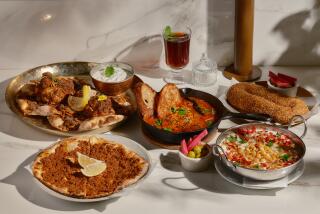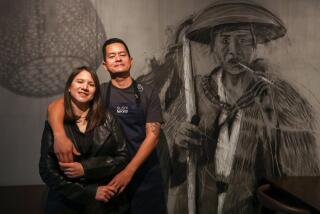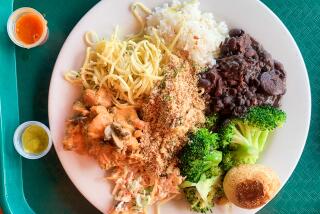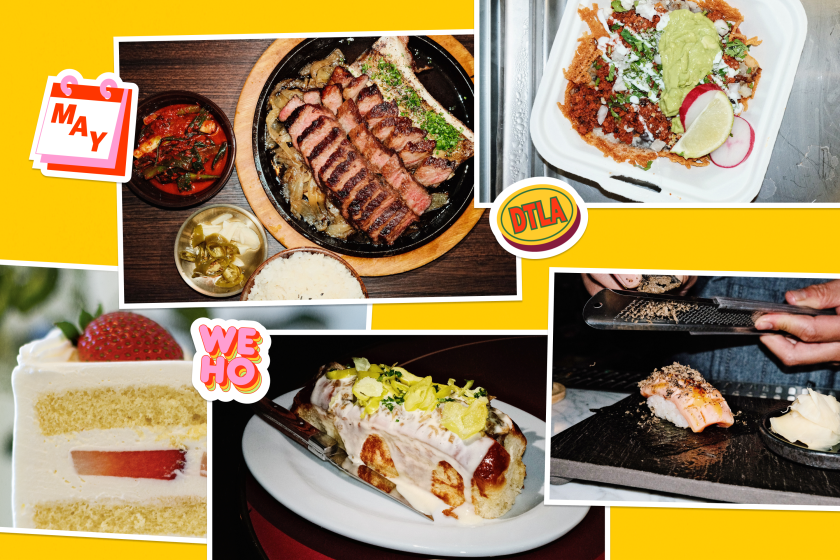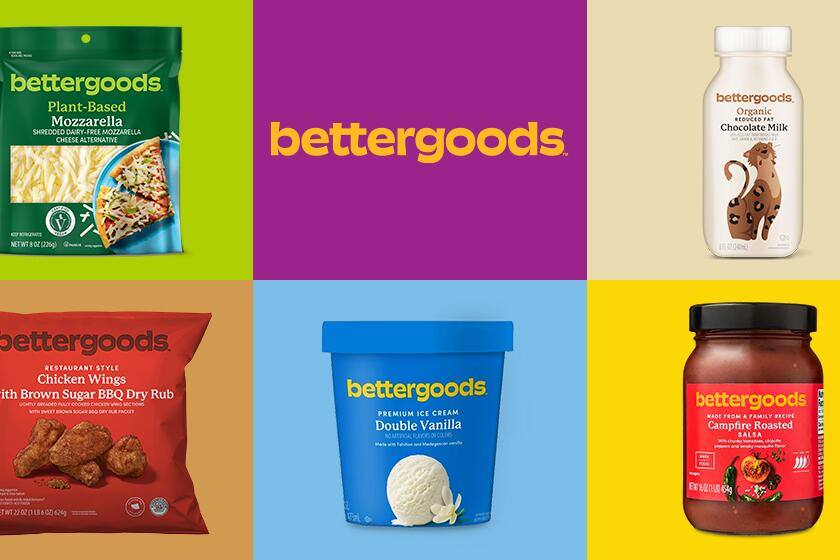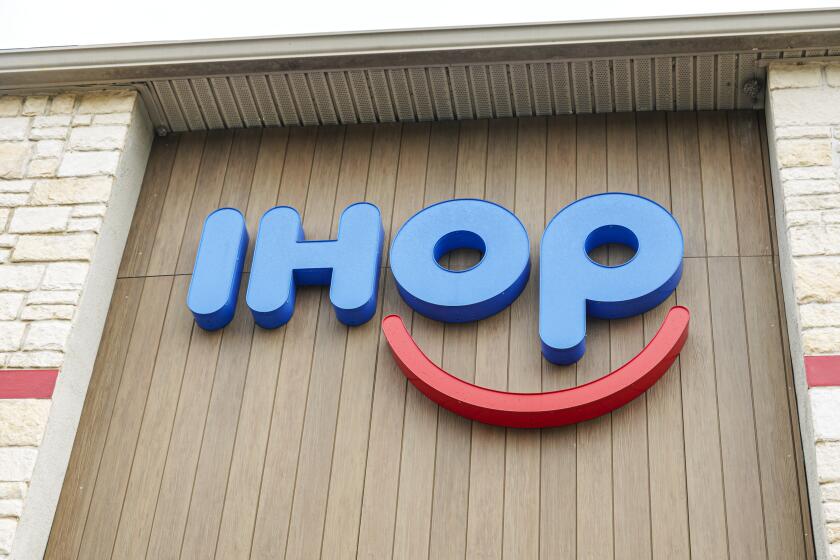It’s not just about grapes
He drives a 43-year-old car that runs on vegetable oil. He keeps a wheelbarrow full of gnarled, 4-foot-long zucchinis on his front porch, beneath a sign that says, “Eat or take to your taxidermist.” He seems at least as interested in -- and proud of -- his bread, his olive oil and his compost heap as he is of his wine.
Clearly, Lou Preston is not your traditional vineyard owner. Indeed, in an industry that -- like most these days -- seems convinced that bigger is better, Preston is not your traditional businessman either. Two years ago, he downsized annual production at Preston of Dry Creek Winery and Vineyards from 25,000 cases of wine to 8,000.
“I had to spend too much time on the road, marketing all those wines,” he says, “when my heart was always right here, with the wine itself and with my bread-baking.
“My wife and I, we always had our favorite blocks of grapes anyway, so we figured, why crush them all when we could work with only the best we have? We signed contracts to sell off about 60% to 65% of our grapes. Now we just make what we like and we make it in small quantities and I’m here to do the things that give me pleasure.”
What seems to give Preston more pleasure than most anything else these days is baking a fabulously crusty peasant bread in a wood-fired brick oven. On the day I visited him in Dry Creek, about 20 minutes north of Healdsburg, in Sonoma County, he was doing just that.
At 61, as he stands in the bakery adjacent to the winery’s tasting room -- with his funky spectacles, battered brown hat, scraggly gray beard and dusty, trusty Birkenstock clogs -- Preston is the very picture of the aging hippie that one would expect in a man so zealous about growing his own vegetables, making organic wines and safeguarding the environment.
“This bread stuff started as a hobby about 15 years ago,” he says, kneading a loaf of sourdough. “But, as things usually do with me, it got out of control. I bake twice a week now, about 50 loaves each time. We sell them in the tasting room.”
The tasting room also sells Preston’s olive oil -- at $25 for a 500-milliliter bottle -- all pressed from the more than 1,000 trees that occupy five acres scattered around his 125-acre property. Vegetables from his garden are on sale in the tasting room, too -- not just zucchinis but tomatoes, eggplant, onions, peppers and garlic.
“The bread and the vegetables all reinforce the food-wine connection that I think this is all about,” Preston says.
Not surprisingly, Preston’s wines are exceptionally food-friendly, especially his signature white, a Sauvignon Blanc with strong stone fruit flavors and a crisp finish. Preston released about 1,750 cases of the 2002 Sauvignon Blanc at $18 a bottle. His best red wine -- a big, earthy Rhone varietal with no label, just “L. Preston Red” silk-screened onto each bottle -- is usually 50% to 60% Syrah, blended with Cinsault, Carignane and Mourvedre. The 2001 release -- about 650 cases -- sells for $24 a bottle.
Preston also produces a straight Syrah, a Zinfandel, a Viognier and a Barbera -- each priced in the $18 to $25 range, with quantities in the 600- to 1,000-case range.
“We started the winery with Cabernet because that’s what everyone was doing in the ‘70s,” Preston says, “but we don’t drink Cab and we don’t drink Chardonnay, and we gravitated toward planting the wines that do best here, in this warm climate and gravelly soil.”
Before Preston and his wife, Susan, bought their first land -- the Hartsock Ranch, 40 acres of prunes and pears in upper Dry Creek Valley -- he was an accountant in San Francisco.
“One year I was asked to handle the BV [Beaulieu Vineyard] audit,” he says. “By the time I was done, I realized I really liked this grape and wine stuff. My family had a farm near Healdsburg, so I quit my job and spent a year at UC Davis. I figured I could learn how to grow grapes and do it on my family’s ranch. But they sold the ranch about the time I finished at Davis, and we had to buy our own land.”
The Prestons continued to buy land and to convert it to vineyards. In the late 1980s -- after seeing olive trees in the vineyards of Tuscany while vacationing in Italy -- they began adding hundreds of olive trees to those already on their property.
“We have a strong Italian connection here,” Preston says in a typical bit of understatement.
Susan’s heritage is Italian, and the Dry Creek farmers and winemakers who helped the Prestons learn the business were men like Americo Rafanelli, Reno Buchignani, Fred Bartolozzi and Jim Guadagni.
Guadagni, a functional illiterate who became such a leader in local wine circles that he was unofficially known as “mayor of Dry Creek,” was a special mentor and inspiration to the Prestons before his death.
Two years ago, they initiated “Guadagni Jug Sunday,” and virtually every Sunday since, they’ve sold winery visitors a Guadagni Jug Wine -- $25 for a three-liter bottle -- that’s 50% Zinfandel, blended with other Preston reds.
Preston is so taken with things Italian that he and winemaker Matt Norelli have tried to make a Sangiovese.
“It was OK but it wasn’t Chianti, so we quit,” Preston says.
But he kept the Italian connection strong by building an outdoor pizza oven and two bocce ball courts adjacent to the vineyards. Preston is now host to an annual bocce tournament -- Gara di Bocce.
Last year, the Prestons accelerated an organic-farming program that began when they abandoned insecticides and fertilizers in 1988.
They earned organic certification for about one-third of their acreage in the early 1990s, but their soils had been “farmed hard for well over a century,” Preston says, and even newer vines “began to look tired, and crops were declining. Full-on organic [farming] didn’t seem to be working.”
Preston hired an organic consultant and started over. Last year he applied for official certification as an organic winemaker. He expects the certification to come next year, making the 2005 wines the first official organic Preston of Dry Creek wines. Meanwhile, workers are planting cover crops in the vineyards, creating what Preston calls “symbiotic colonies of good bugs” and using compost as fertilizer.
While waiting for his bread to bake during our visit, Preston took me out to three huge compost heaps and poked each several times with a 4-foot-long temperature probe. “It’s got to be 140 degrees for three weeks to kill the pathogens and make it safe for us to use,” he said, “and they’re not quite there yet.”
Later he pointed out one of his tractors and his car -- a 1960 Mercedes that he bought on EBay early this year. Both have been converted from diesel fuel to run on vegetable oil -- “Canola oil, corn oil, walnut oil, olive oil.... They’re all a lot cleaner and cheaper than gas,” he says.
“Olive oil?” I ask. “Your own olive oil?”
He laughs.
“No. That would cost about $200 a gallon.”
David Shaw can be reached at david.shaw@latimes.com.
More to Read
Eat your way across L.A.
Get our weekly Tasting Notes newsletter for reviews, news and more.
You may occasionally receive promotional content from the Los Angeles Times.
